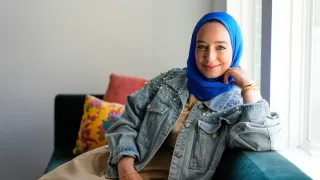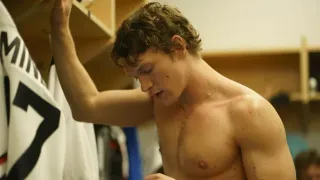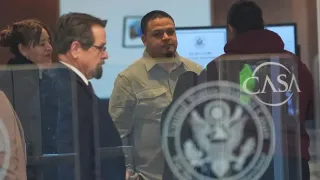March 1, 2024
Actress Annette Miller Returns to Playing Golda Meir – 'It's More Vital Right Now'
Kilian Melloy READ TIME: 9 MIN.
EDGE: You had a hand in shaping the script to its current form.
Annette Miller: We gave it a reading for 25 or 30 invited guests, and the response was great. But it was written in two acts, and we did the reading with me finishing the first act when she's speaking to the [Council of Jewish Federations and Welfare Funds] and asking for money, and then it ends. "It's up to you!" she says, [and] I walk offstage.
I said to Bill, backstage, "Why did I come off? Because I'm going back on in the same place." He said, "Well, you can't stay on for two hours." I said, "I could certainly do 90 minutes." And he said, "Sure." He let Danny Kudrow – a marvelous, wonderful, brilliant director from Israel – and I work on it, and he okayed [our cuts], or he didn't okay it, [but] he took it on. It was just wonderful [to be allowed such input].
EDGE: Recent history being what it is, are the things you'd want to restore or things you'd want to change about the script again? Or do you think that the script as it has been all these years is still exactly what we need to see?
Annette Miller: It's exactly what we need, because it's not a preachy show, it's her journey. I'm 20 years older; I'm closer to her age now than I was than I was when I did it then – I think I'm past her age now – and she's looking at her life. She knows the choices she made, she knows the problems, but she has no regrets. The only regret she has, which is why she resigned, is that she lost 3,000 boys [in the defense of Israel during the Yom Kippur war]. I don't think she ever forgave herself for that, ever. But she doesn't regret her life's journey; she says, "Failure is not my story. Where nothing was, Israel is." And this is true. This is at the bottom of it.
EDGE: You mention being closer to Golda Meir's age now. Has your relationship to the character in the play changed over time?
Annette Miller: It's got to be [the case that it has]. First of all, I never play what I did the night before. I'm always playing something where I am now. So now, 20 years later, when I say I'm "telling you a few tales from my life," I understand now. I can understand her review of her life more.
EDGE: You actually saw Golda Meir talk during your time as a student at Brandeis. That must have been a powerful moment. It must have influenced women of the time to grasp their own power.
Annette Miller: It's not even the sense of power as so much as the sense of having control of your own destiny, to be able to go for it. That's what she did. She speaks about her own personal independence [in] 1928, when she decided that she could not any longer live in the way she was living, just in two rooms in Jerusalem. She had to go where she could make a difference. The work was harder and the money was less, but there was an inner calling [she had] to follow. She's got quite a mission, and it's invigorating – easier to accomplish on stage than in life.
[Laughter]
I probably didn't know what I was doing when I first did "Golda." Now I'm doing it over again [I think I understand her more]. I am so full of Golda now. I don't know where everyone gets the idea that, "Well, as you get older it's time to relax and sit back." Why? There's still work to be done!
"Golda's Balcony" plays at the Jackie Liebergott Black Box Theatre at the Emerson Paramount Center from Feb. 23 – March 10. For more information follow this link.






